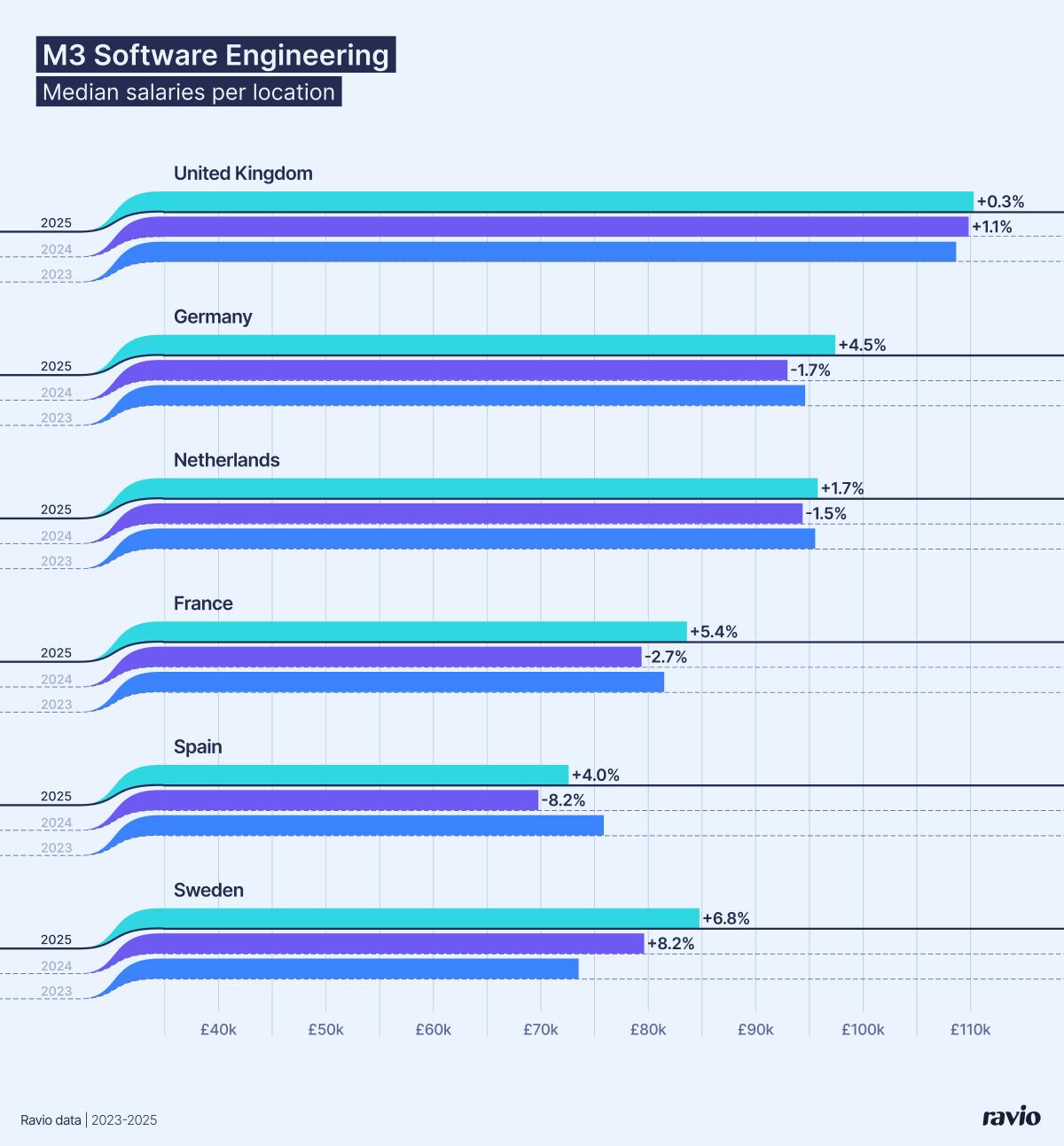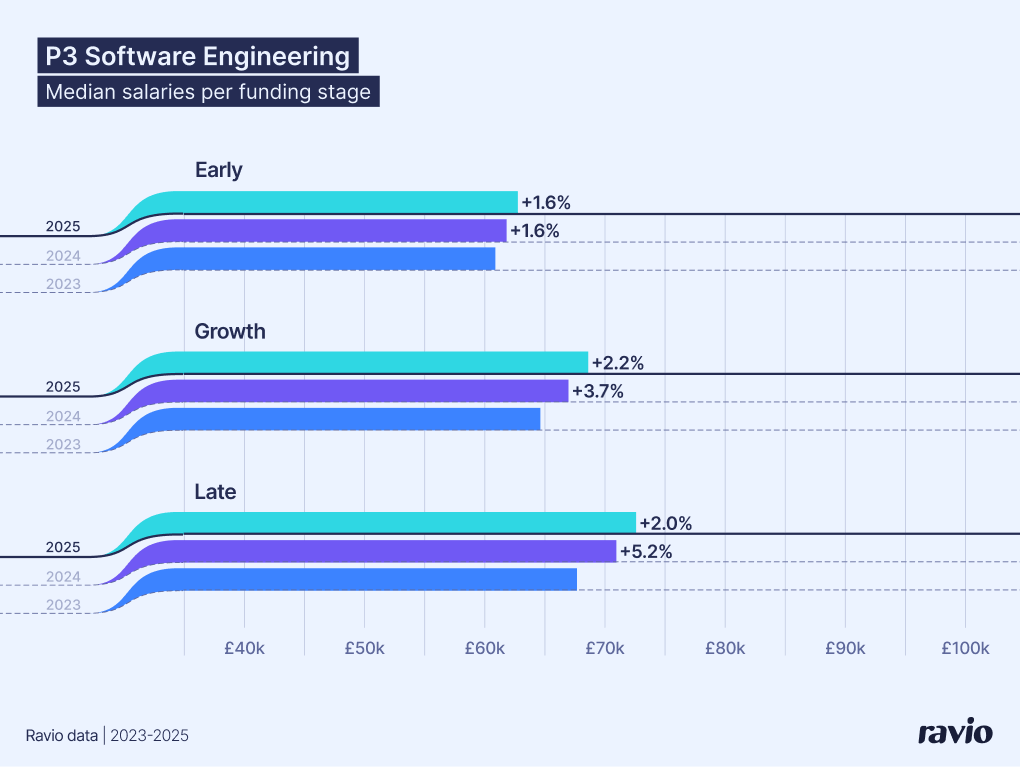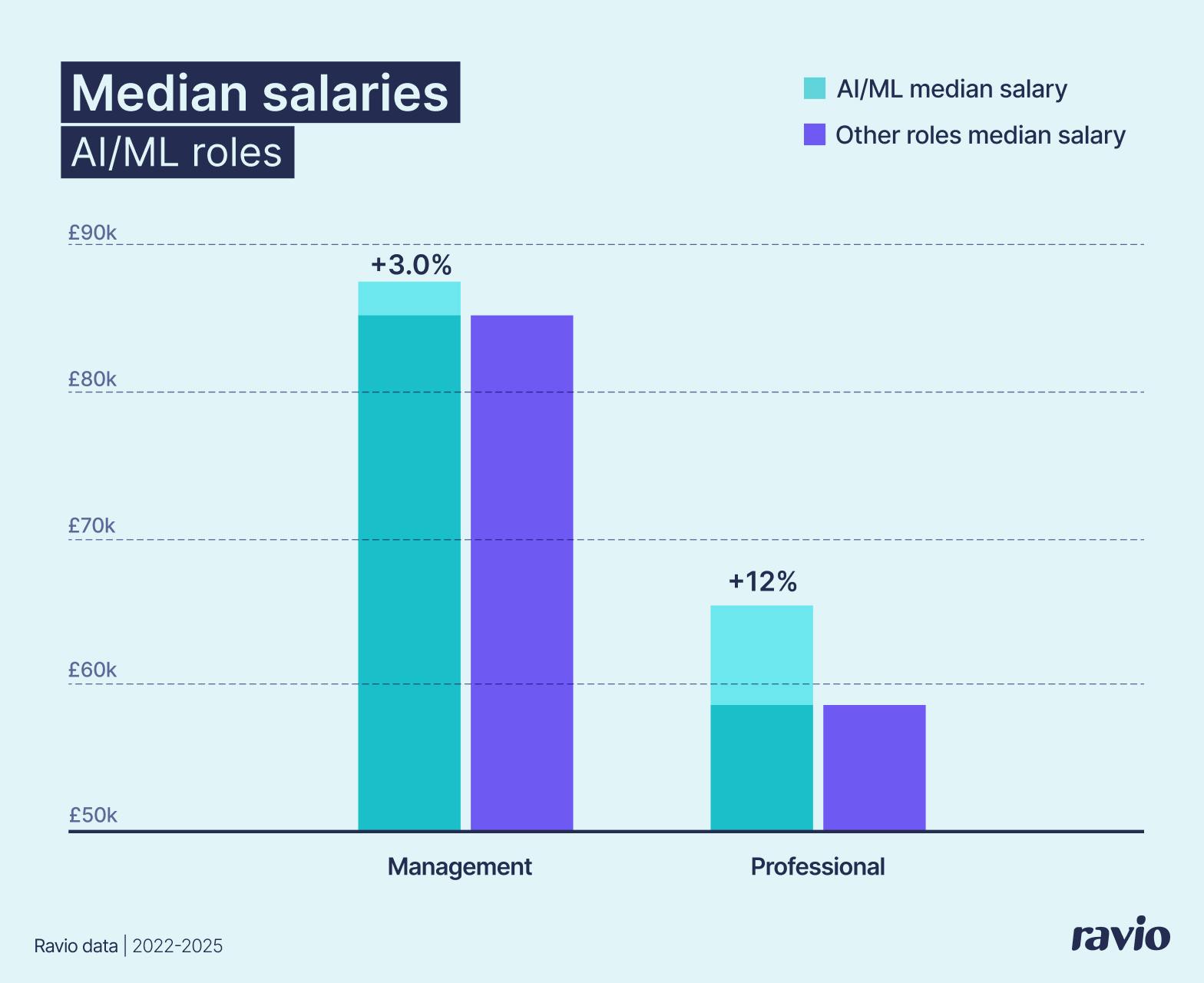What should you be paying your Software Engineers? How do salaries compare across European markets? Are you staying competitive with the market rate in 2025?
For People and Reward Leaders setting the strategy, Talent Acquisition Leads scouring the market, and line managers making decisions on new hire offers and salary increases to retain existing team members, understanding Software Engineer salary trends is essential.
Offer too little and you'll lose candidates to competitors. Overpay and you'll strain budgets and create internal pay equity issues.
So, to help, let's look at the latest data on average Software Engineer salaries – including how salaries differ by location, funding stage, and the premium AI Engineers are commanding in 2025.
Software Engineer average salary in 2025
The average salary for a Software Engineer in 2025 is £70,500 (Ravio Compensation Trends report, October 2025).
This is the median salary as per Ravio’s salary benchmarking data, for a UK-based P3 Established Professional Software Engineer – a mid-level professional (or Individual Contributor), someone with in-depth knowledge of their discipline who works independently with minimal guidance and has a moderate impact on the success of their discipline.
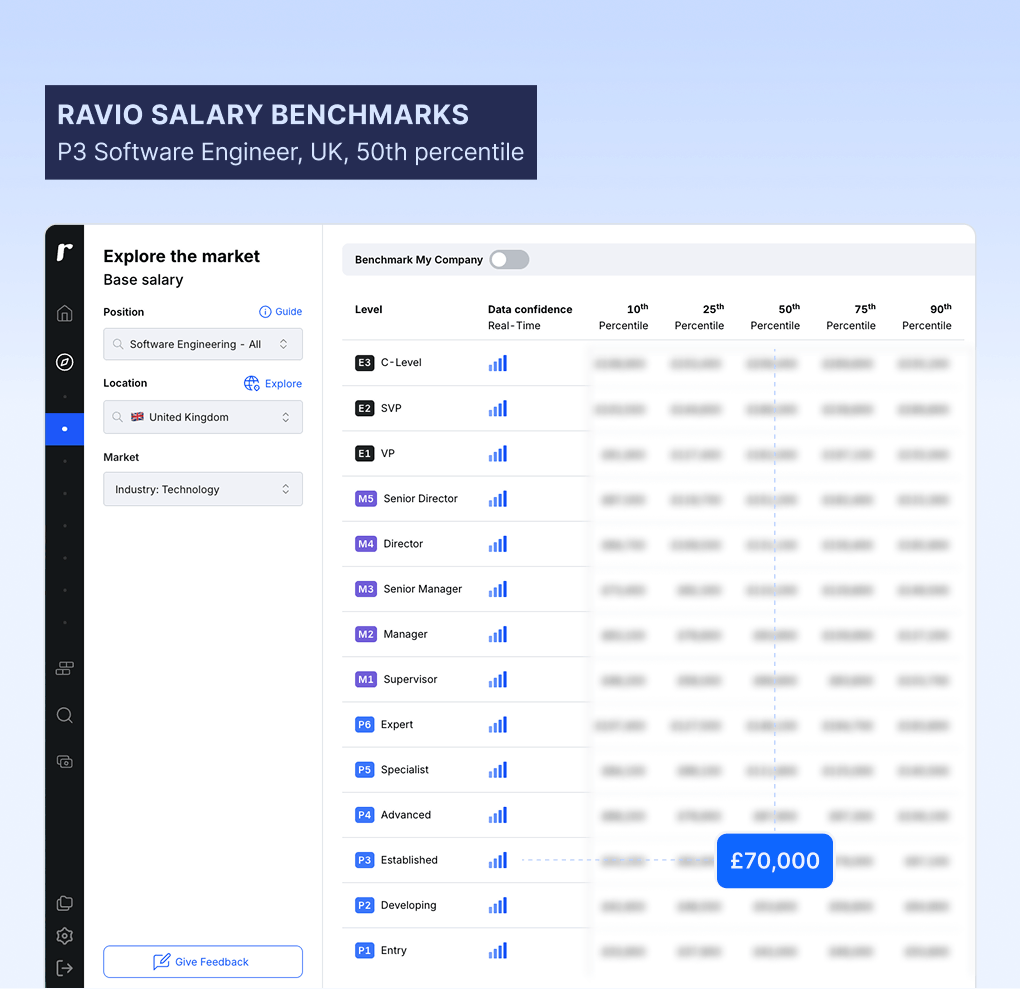
Software Engineer salaries in the UK increased modestly in 2025, up 1.6% from £68,900 in 2024. This continues a trend of slowing salary growth, with 2024 having seen an 8.5% increase from 2023's £63,500.
The slower growth in 2025 suggests Software Engineer salaries may be stabilising after the rapid increases seen in previous years.
How do average Software Engineer salaries differ per country?
Software Engineer salaries vary significantly across European markets, with the UK maintaining the highest median salaries whilst Spain has the lowest:
- UK average Software Engineer salary in 2025: £70,000 – up 1.6% from 2024
- Germany average Software Engineer salary in 2025: £64,500 (€74,100) – up 1.9% from 2024
- Netherlands average Software Engineer salary in 2025: £63,700 (€73,200) – up 1.6% from 2024
- Sweden average Software Engineer salary in 2025: £59,700 (€68,600) – up 5.5% from 2024
- France average Software Engineer salary in 2025: £57,100 (€65,600) – up 1.2% from 2024
- Spain average Software Engineer salary in 2025: £48,600 (€55,900) – up 1.0% from 2024
Ravio’s 2026 Compensation Trends report highlights that most European markets saw modest salary increases in the 1-2% range in 2025, notably slower than the previous year. The UK, which saw 8.5% growth in 2023-24, recorded just 1.6% growth this year.
Sweden stands out as the exception to this trend, continuing to see strong salary growth at 5.5% – building on the 16.9% growth seen in 2024. This reflects Sweden's maturing tech ecosystem and increasing demand for engineering talent.
"The cost advantages of hiring Engineering hubs in lower-cost countries like Poland or Romania are still very attractive. But we're also seeing an increase in startups deliberately keeping their hiring local in the early days, avoiding the added complexity of managing different market rates, employment laws, and cultural expectations."

Talent Director at Atomico
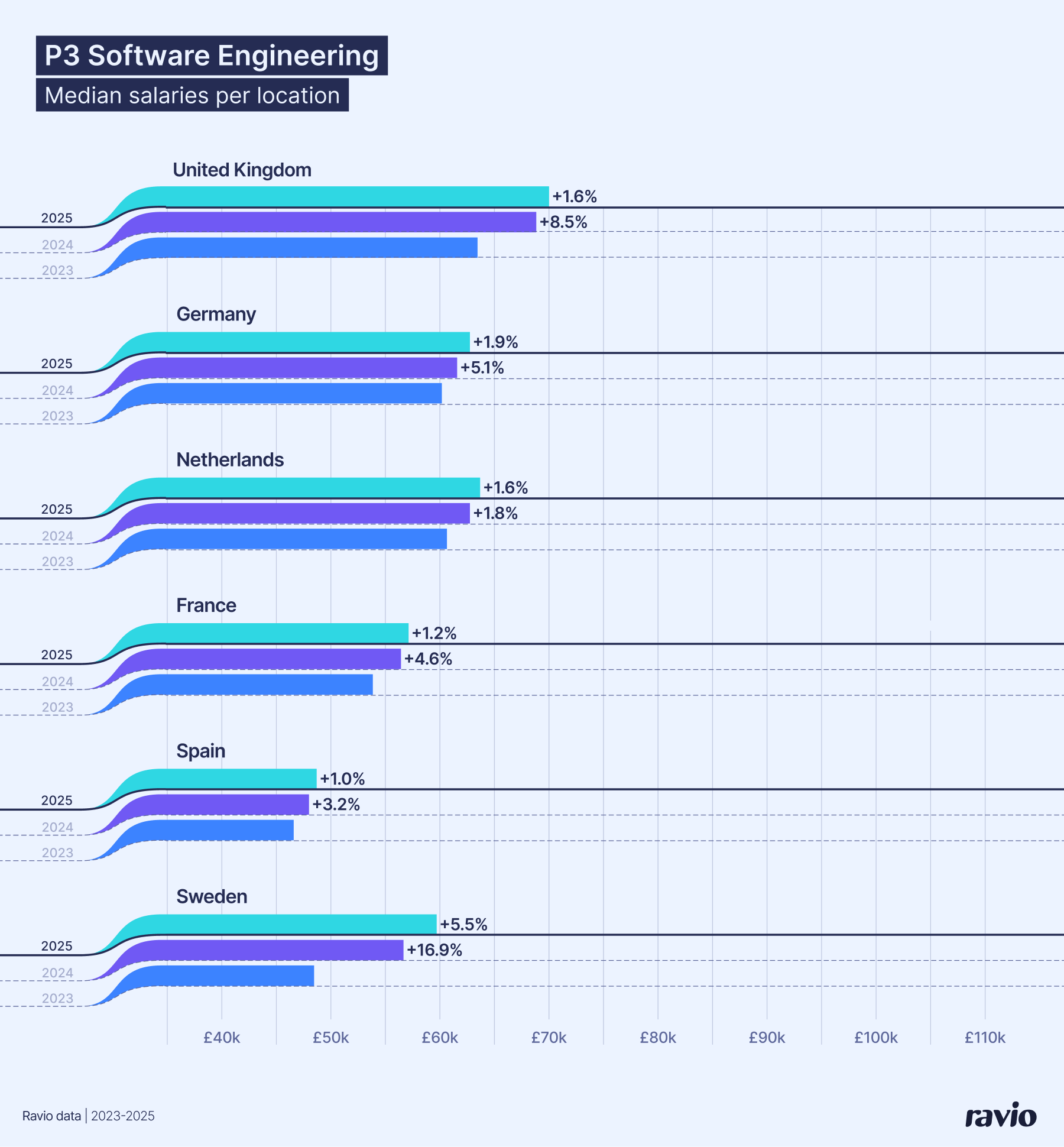
Senior Software Engineer average salary in 2025
The average salary for a Senior Software Engineer in 2025 is £110,200 (Ravio Compensation Trends report, October 2025).
This is the median salary as per Ravio’s salary benchmarking data, for a UK-based M3 Senior Manager Software Engineer – a role providing leadership to other managers, accountable for the results of a team.
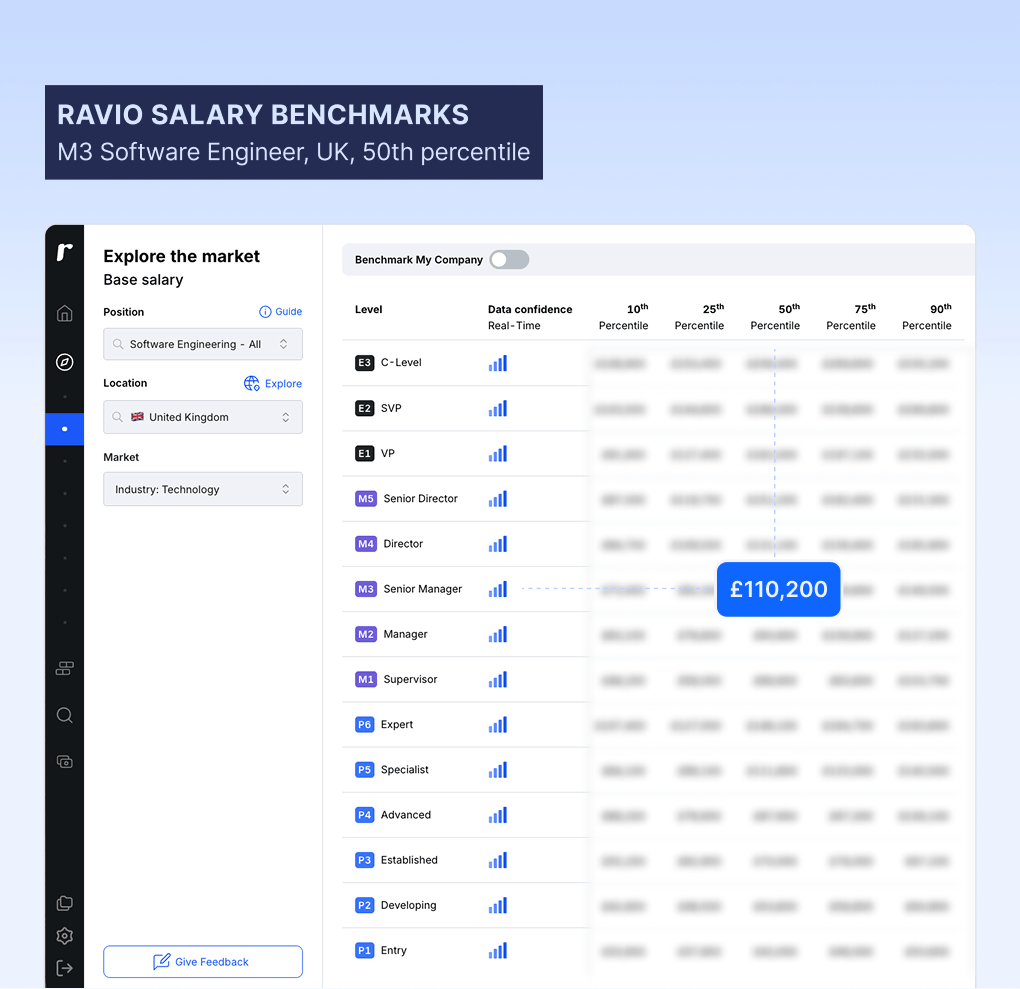
Senior Software Engineer salaries in the UK saw minimal growth in 2025, up just 0.3% from £109,900 in 2024. This represents a significant slowdown from 2024's 1.1% increase from 2023's £108,700. The near-flat growth in 2025 suggests Senior Software Engineer salaries have largely stabilised in the UK market.
How do average Senior Software Engineer salaries differ per country?
Senior Software Engineer salaries vary significantly across European markets, with the UK maintaining the highest median salaries:
- UK average Senior Software Engineer salary in 2025: £110,200 – up 0.3% from 2024
- Germany average Senior Software Engineer salary in 2025: £97,300 (€111,800) – up 4.5% from 2024
- Netherlands average Senior Software Engineer salary in 2025: £95,800 (€110,100) – up 1.7% from 2024
- Sweden average Senior Software Engineer salary in 2025: £84,900 (€97,600) – up 6.8% from 2024
- France average Senior Software Engineer salary in 2025: £83,700 (€96,200) – up 5.4% from 2024
- Spain average Senior Software Engineer salary in 2025: £72,600 (€83,400) – up 4.0% from 2024
Whilst the UK and Netherlands saw minimal salary growth for Senior Software Engineers (0.3% and 1.7% respectively), France, Spain, and Sweden showed much stronger increases – 5.4%, 4.0%, and 6.8% respectively.
The gap between highest and lowest paying markets is narrowing, with traditionally lower-paying markets growing engineering management salaries at several times the rate of established high-paying tech markets like the UK.
The stronger growth in France, Spain, and Sweden could reflect these tech ecosystems maturing and requiring more senior engineering leadership, or a lower supply of experienced engineering managers in these markets driving more competitive salaries.
How do startup Software Engineer salaries differ per funding stage?
Software Engineer salaries increase consistently as startups progress through funding stages, reflecting both company maturity and ability to pay competitive rates.
Late-stage companies (Series C+, IPO) pay approximately 15% more than early-stage companies (pre-seed, seed) for mid-level Software Engineers, and 31% more for senior engineering leadership roles. This premium reflects both the financial resources available at later stages and the increased complexity and scale of engineering challenges.
Software Engineer (P3) salaries per funding stage
For mid-level Software Engineers, median salaries in 2025 are:
- Early-stage startup Software Engineer salary: £62,900 – up 1.6% from 2024
- Growth-stage startup Software Engineer salary: £68,500 – up 2.2% from 2024
- Late-stage startup Software Engineer salary: £72,500 – up 2.0% from 2024.
Software Engineer salaries increased modestly across all funding stages in 2025, with growth and late-stage companies seeing slightly higher increases (2.0-2.2%) compared to early-stage (1.6%). This consistent pattern maintains the typical salary differential as companies scale.
Senior Software Engineer (M3) salaries per funding stage
For senior engineering leadership, median salaries in 2025 are:
- Early-stage Senior Software Engineer salary: £94,500 – up 1.7% from 2024
- Growth-stage Senior Software Engineer salary: £111,600 – up 1.5% from 2024
- Late-stage Senior Software Engineer salary: £124,000 – up 1.7% from 2024
Senior Software Engineer salaries showed similarly modest increases across all stages in 2025 (1.5-1.7%). This uniform growth contrasts with previous years when different funding stages often showed more varied patterns, suggesting salary structures are stabilising across the startup ecosystem.
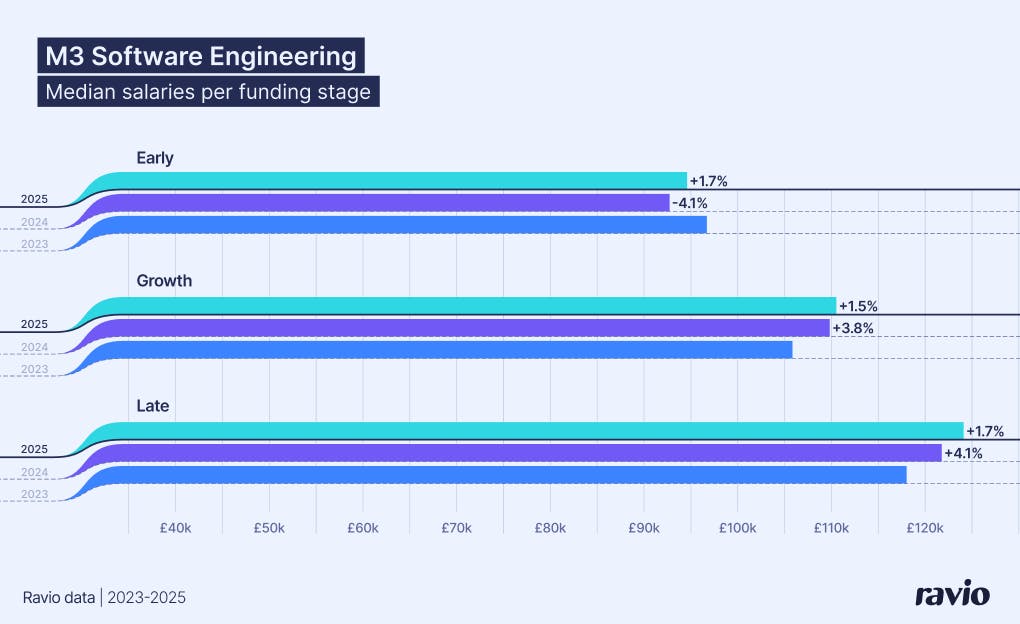
Software Engineer salary vs AI Engineer salary in 2025
One Software Engineer salary trend that’s top of mind in 2025, is that AI Engineers now command a significant salary premium over general Software Engineers – reflecting the high demand for AI expertise in the talent market.
AI Engineers now command a significant salary premium over general Software Engineers, reflecting the high demand for AI expertise in 2025.
For our 2026 Compensation Trends report we analysed the pay premium for AI/ML roles vs all other roles and found an average 12% AI pay premium in the Professional (IC) career track, and an average 3% AI pay premium in the Management career track.
So, if we apply this data to average Software Engineer salaries:
Software Engineer (P3) vs AI Engineer salary:
- Software Engineer median salary: £70,000
- AI Engineer median salary: £78,400 (+12%)
Senior Software Engineer (M3) vs Senior AI Engineer salary:
- Senior Software Engineer median salary: £110,200
- Senior AI Engineer median salary: £113,500 (+3%)
This salary premium reflects the value companies are placing on AI expertise as they race to build AI capabilities into their products and services.
"Every company is either hiring for AI talent or upskilling existing teams, but success depends on being intentional about it. Some clearly understand what AI capabilities they need; others are just reacting to FOMO. The companies that balance being lean with rewarding high-impact AI talent are the ones attracting both funding and the right people."

Early Stage People Lead at EQT Ventures
FAQs
What is the average salary of a software engineer?
The average salary of a Software Engineer in 2025 is £70,000. This is the median salary for a P3 Established Professional Software Engineer in the UK as per Ravio’s Compensation Trends report (published October 2025) – Software Engineer salaries vary significantly by location and level. For example, Germany averages £64,500 whilst Spain averages £48,600 for the same P3 level. Senior Software Engineers (M3) earn considerably more, with UK median salaries at £110,200.
What is the average salary of a software engineer in the UK?
The average salary of a Software Engineer in the UK is £70,000 for a P3 Established Professional level (Ravio Compensation Trends report, October 2025). For Senior Software Engineers (M3 level), the UK median salary is £110,200. Salaries increased modestly in 2025 (1.6% for P3, 0.3% for M3), suggesting Software Engineer salaries are stabilising after the rapid increases seen in previous years.
What is the average salary of a software engineer in the US?
The average salary of a Software Engineer in the US is $150,000 for a P3 Established Professional level (Ravio benchmarks, October 2025). For Senior Software Engineers (M3 level), the US median salary is $219,800. US Software Engineer salaries are significantly higher than European markets, with the UK equivalent being £70,000 for P3 and £110,200 for M3. Ravio's platform includes real-time salary benchmarks for different US locations, job levels, and Software Engineering specialisms.
What is typical total compensation for a software engineer?
Typical total compensation for a Software Engineer includes base salary plus equity compensation. In the tech sector, it's common for Software Engineers to receive equity as part of their compensation package – with the median new hire equity grant at 8.6% of base salary at the 50th percentile (Ravio equity benchmarking data). Variable pay is less common for Software Engineers, though some companies offer on-call payments or company-wide programmes like performance bonuses or profit-sharing schemes.
What are the top hiring trends in software engineering?
The top hiring trends in Software Engineering in 2025 (from Ravio’s Compensation Trends report) include:
- AI/ML hiring surge – AI/ML roles saw 88% year-on-year growth, with AI Engineers commanding a 12% salary premium over general Software Engineers.
- Stabilising salaries – Software Engineer salaries increased modestly in 2025 (1.6% for P3, 0.3% for M3) after rapid growth in previous years.
- Steady hiring rates – overall hiring in Engineering remains stable at around 21%, the lowest across all job functions.
- Entry-level decline – P1 and P2 hiring rates dropped 73% as AI automates routine tasks traditionally performed by junior engineers.
- Strong retention – Engineering maintains the lowest attrition rate at 12%, with Software Engineers prioritising job security.
Where can I get reliable salary benchmarking data for software engineers?
Reliable Software Engineer salary benchmarking data comes from real-time compensation platforms like Ravio, which draws from direct HRIS integrations. Unlike annual salary surveys that provide 6-18 month old data, Ravio's benchmarks are continuously updated to reflect current market conditions. Ravio provides global Software Engineer salary data, across all job levels and multiple specialisms (Backend, Frontend, Full Stack, AI/ML, etc).

